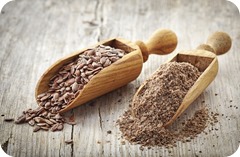Fiber and omega-3 fatty acids have been shown to have at least modest antihypertensive benefits but research on flax seeds for this purpose have been conflicting. Flax seed constituents include fiber, an omega-3 fatty acid alpha-linolenic acid (ALA), the peptide KCI-F1, and perhaps its most well-known component, the lignans. The purpose of this research was to do a systematic review and meta-analysis to evaluate the effect of flaxseed on blood pressure in humans.
antihypertensive benefits but research on flax seeds for this purpose have been conflicting. Flax seed constituents include fiber, an omega-3 fatty acid alpha-linolenic acid (ALA), the peptide KCI-F1, and perhaps its most well-known component, the lignans. The purpose of this research was to do a systematic review and meta-analysis to evaluate the effect of flaxseed on blood pressure in humans.
Databases were searched for randomized trials and blood pressure, using flaxseeds. Studies that were selected for inclusion in the review and meta-analysis were those that had a flaxseed and a control group, a duration of at least 2 weeks and those with a case-control or crossover design.
Out of the 622 studies that the search yielded, 15 studies met the inclusion criteria and were thus included in the meta-analysis which then had a total of 1302 subjects. A total of 618 were treated with flaxseed, 140 were treated with other therapies and 544 with placebo. Studies included spanned Canada, Brazil, China, India, Australia, Denmark, Finland and Greece.
The formulas used in these 15 trials were either 1.2-15 gm/day of alpha linoleic acid (ALA) flaxseed oil, 360-600 mg/day of flax lignan extract or 28-60 gm/day of flaxseed powder and studies ranged from 4 to 12 weeks.
Commentary: This meta-analysis showed that only the flaxseed powder treatment had a significant reduction in systolic and diastolic blood pressure and that the flaxseed powder and flax oil had a significant effect on reducing diastolic blood pressure. Lignan extract therefore had no effect on either systolic or diastolic blood pressure and that the flax oil only had an effect on reducing diastolic blood pressure.
Some of the studies had a small number of individuals in the studies, a lack of homogeneity in the study subjects, and the variety of doses and forms and even kind of flax seeds used (brown or golden seeds)
In this meta-analysis, there was a decrease of 2.85 systolic pressure and 2.39 diastolic pressure with the flax seeds. A decrease of 3.3/1.4 mmHg has been associated with a 22% decline of relative risk of cardiovascular mortality and this meta-analysis is showing the flax seeds could be meaningful in reducing death from cardiovascular disease.
There are many reasons to include flaxseed powder in the diet (ex/constipation, irritable bowel, breast health, cardiovascular mortality, polycystic ovarian syndrome, insulin resistance), and specifically a small but meaningful effect on lowering both systolic and diastolic blood pressure. An easy method of delivery is to add 30 gm-60 gm/day(2-4 Tablespoons) to your smoothie.
Reference
Ursoniu S, Sahebkar A, Andrica F, Serban C, Banach M; Lipid and Blood Pressure Meta-analysis Collaboration (LBPMC) Group. Effects of flaxseed supplements on blood pressure: A systematic review and meta-analysis of controlled clinical trial. Clin Nutr. May 29, 2015; [epub ahead of print]. doi: 10.1016/j.clnu.2015.05.012.

